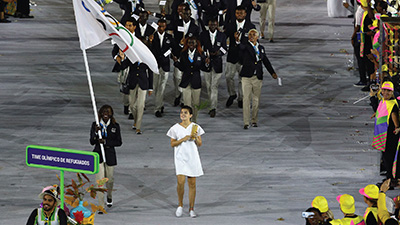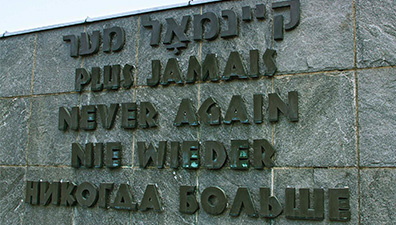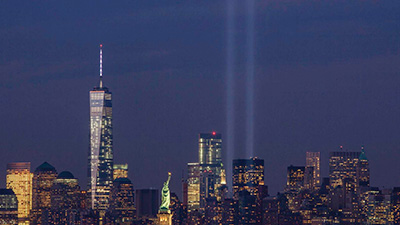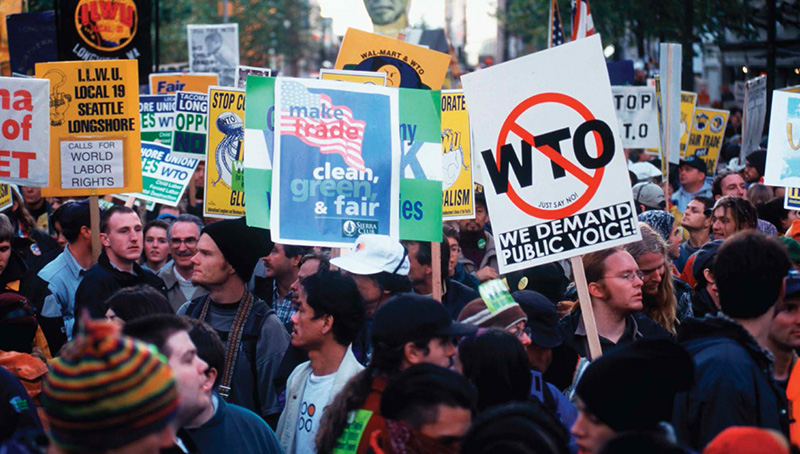Global Conflicts
Teacher Resources
Driving Question: How have the tensions of globalization sparked new conflicts?
A more-connected world hasn’t necessarily meant a more-peaceful one. Discover how global tensions continue to fuel unrest around the world.
Learning Objectives:
- Use evidence to analyze how globalization has contributed to modern conflict and resistance.
- Use the historical thinking practice of claim testing to analyze the effects of globalization.
Vocab Terms:
- economic liberalization
- globalization
- multinational
- non-governmental organization
- outsource
- privatize
- unsustainable
Opener: Global Conflicts
To teach this lesson step, refer to page 2 of the Lesson 9.6 Teaching Guide.
After the horrors of the early twentieth century, many sought to prevent further atrocities. Use this quick opener to consider their successes and failures.
Barriers to Progress
To teach this lesson step, refer to page 3 of the Lesson 9.6 Teaching Guide.
Take a look at our Reading Guide to learn about the Three-Step Reading approach.
Even as globalization connects the world, deep divisions remain. With these materials, you’ll explore how nationalism and human rights violations have challenged efforts to create a more-peaceful and cooperative global society.
-
Guiding Questions
-
Before you read
Preview the questions below, and then skim the article. Be sure to look at the section headings and any images.
While you read
Look for answers to these questions:
- How do international sports reveal tensions around national identity?
- Why did transnational ideas grow after the mid-twentieth century?
- How did nationalism support reconciliation in Rwanda?
- How has racially defined nationalism reemerged in recent decades?
- How can definitions of national identity exclude people?
After you read
Respond to these questions: Do you think nationalism will continue to grow in response to global challenges, or will transnational cooperation become more important? Why?
-
Guiding Questions
-
Before you read
Preview the questions below, and then skim the article. Be sure to look at the section headings and any images.
While you read
Look for answers to these questions:
- How was the United States connected to the genocide in Cambodia?
- Who did Saddam Hussein target in Iraq’s campaign of mass killing?
- How did propaganda contribute to the Rwandan genocide?
- What groups were involved in the Rwandan genocide?
- How has religion influenced the genocides in Bosnia and Myanmar?
After you read
Respond to these questions: How has the global response to genocide changed since 1945? What does this reveal about the power of human rights over time?
Terrorism
To teach this lesson step, refer to page 9 of the Lesson 9.6 Teaching Guide.
Terrorist attacks affect communities in both the long and the short term. Learn how the events of September 11, 2001, reshaped the world and sparked debates about justice, identity, and the global consequences of conflict.
-
Guiding Questions
-
Before you read
Preview the questions below, and then skim the article. Be sure to look at the section headings and any images.
While you read
Look for answers to these questions:
- What question did many Americans ask after 9/11?
- Why is it inaccurate to blame Islam for the 9/11 attacks?
- What is the “Clash of Civilizations” theory?
- How is the Soviet invasion of Afghanistan connected to 9/11?
- What was Osama bin Laden’s strategy behind the attacks?
After you read
Respond to these questions: Do you think the US response to 9/11 was effective? Why or why not? Use one course frame to support your answer.
Closer: Global Conflicts
To teach this lesson step, refer to page 10 of the Lesson 9.6 Teaching Guide.
Closers are a great way to informally assess student progress. Learn more in our OER Project Assessment Guide.
Reflect on how our global connections have both created new communities while also igniting new conflicts.
Voices of Resistance
To teach this lesson step, refer to page 11 of the Lesson 9.6 Teaching Guide.
Globalization hasn’t just connected people—it has also sparked resistance. These sources show how individuals and groups have challenged global systems, offering more insight into the tensions that shape today’s world.







